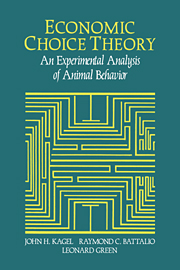Book contents
- Frontmatter
- Contents
- Preface
- Chapter 1 Introduction
- Chapter 2 Commodity-choice behavior I: Some initial tests of the theory
- Chapter 3 Commodity-choice behavior II: Tests of competing motivational processes and the representative consumer hypothesis
- Chapter 4 Labor-supply behavior I: Initial tests of the theory with some public policy implications
- Chapter 5 Labor-supply behavior II: Tests of competing motivational processes and earnings distributions for animal workers
- Chapter 6 Choices over uncertain outcomes
- Chapter 7 Intertemporal choice
- Chapter 8 Summing up
- Bibliography
- Index
Chapter 7 - Intertemporal choice
Published online by Cambridge University Press: 22 March 2010
- Frontmatter
- Contents
- Preface
- Chapter 1 Introduction
- Chapter 2 Commodity-choice behavior I: Some initial tests of the theory
- Chapter 3 Commodity-choice behavior II: Tests of competing motivational processes and the representative consumer hypothesis
- Chapter 4 Labor-supply behavior I: Initial tests of the theory with some public policy implications
- Chapter 5 Labor-supply behavior II: Tests of competing motivational processes and earnings distributions for animal workers
- Chapter 6 Choices over uncertain outcomes
- Chapter 7 Intertemporal choice
- Chapter 8 Summing up
- Bibliography
- Index
Summary
Except in Section 6.5, we have not said much about how differences in the time to the arrival of commodities affect choice. This chapter considers (a) the relationship between commodities having different arrival times, and (b) the role of time discounting on choice. Experimental psychologists have done intensive research on choice between temporally differentiated commodities. In particular, they have considered choices between smaller, more immediate rewards and larger, more delayed alternatives. Much of this research has focused on the nature of the time discount function, with particular attention to those factors that promote impulsiveness versus an enhanced ability to delay gratification.
Section 7.1 presents some of the elementary economic concepts of intertemporal choice. We compare the “standard” choice model employed in the economics literature with predictions drawn from reinforcement theory in psychology. Experimental procedures employed in measuring time discount rates are discussed in Section 7.2, along with the results of a number of experiments reported in the psychology literature. These experiments show that rats and pigeons effectively employ rudimentary present discounted value calculations in deciding between alternatives. However, they also display dynamic inconsistencies, contrary to the economist's standard intertemporal choice formulation. With short delays between choice and outcomes, smaller, more immediate rewards are often preferred to larger, more delayed alternatives. However, with longer delays between choice and outcomes, the larger, more delayed alternative is preferred. We discuss the implications of time discounting for optimal foraging theory and its potential adaptive significance, along with some of the economic implications of rejecting the standard intertemporal choice formulation.
- Type
- Chapter
- Information
- Economic Choice TheoryAn Experimental Analysis of Animal Behavior, pp. 173 - 199Publisher: Cambridge University PressPrint publication year: 1995



